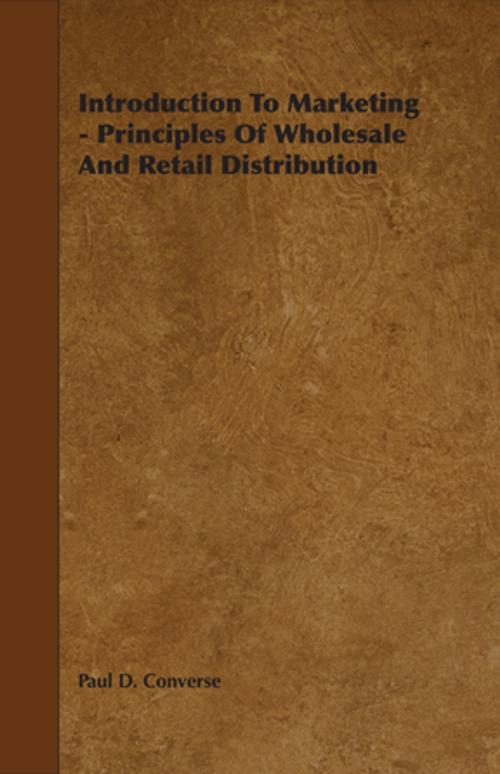Introduction To Marketing - Principles Of Wholesale And Retail Distribution
Business & Finance, Economics| Author: | Paul D. Converse | ISBN: | 9781446549063 |
| Publisher: | Read Books Ltd. | Publication: | April 16, 2013 |
| Imprint: | Meisel Press | Language: | English |
| Author: | Paul D. Converse |
| ISBN: | 9781446549063 |
| Publisher: | Read Books Ltd. |
| Publication: | April 16, 2013 |
| Imprint: | Meisel Press |
| Language: | English |
INTRODUCTION to MARKETING PRINCIPLES OF WHOLESALE AND RETAIL DISTRIBUTION by Paul D. Converse. Preface: THIS BOOK has a definite objective to combine a treat ment of general marketing methods and principles with a more detailed treatment of retailing, particularly the operation of small and medium-size stores. It is believed that one . can not properly understand retailing without some knowledge mar ket economics and wholesaling. Students will understand ptail store operation better if they first secure a general knowledge of the field of marketing and know the place of retailing in the over all picture. Therefore, market economics, the physical handling of goods, and wholesaling are treated before the discussion of retailing is begun. Paul D. Converse Fred M. Jones. Contents include: I. Introduction 1. THE MEANING AND SCOPE OF MARKETING 3 2. THE PHYSICAL HANDLING OF GOODS 21 3. MIDDLEMEN, TRADE CHANNELS, AND COMMODITIES 38 THE CONSUMER 54 II. Wholesale Marketing A. Organizations 5. COMMISSION MERCHANTS, BROKERS, AND AUCTIONS 75 WHOLESALE MERCHANT 87 TTHE MANUFACTURER AND HIS OUTLETS 101 B. Commodities 8. THE AGRICULTURAL MARKETING PROBLEM 125 9. THE MARKETING OF GRAIN 143 10. THE MARKETING OF COTTON l6l 11. THE MARKETING OF INDUSTRIAL GOODS 174 III. Retail Marketing A. Organizations INDEPENDENT RETAILER 191 xtf THE CHAIN STORE 2Og Xi, THE DEPARTMENT STORE 223 15. THE CONSUMER COOPERATIVE MOVEMENT 237 Vli viii CONTENTS B. Starting a Retail Store 16. BECOMING AN OWNER OF A RETAIL STORE 857 17. THE IMPORTANCE OF STORE LOCATION 371 18. SELECTING, TRAINING, AND SUPERVISING EMPLOYEES 86 C. Buying and Pricing 19. BUYING WHAT, WHEN, AND HOW MUCH TO BUY 303 20. BUYING WHERE AND HOW TO BUY 319 21. THE PROBLEM OF PRICING 335 D. Selling LES PROMOTION WHAT IT is 359 EFFECTIVE ADVERTISING 373 , WINDOW DISPLAY 389 STOCK ARRANGEMENT AND DISPLAY 403 THE ESSENCE OF SALESMANSHIP 417 E. Finance and Control 27. THE EXTENSION OF CREDIT 437 28. RECORD KEEPING 460 29. TAX RECORDS AND REPORTS 481 STOCK CONTROL AND STOCK TURNOVER 494 MERCHANDISING EFFICIENCY 508 32. THE PROBLEM OF INSURANCE 525 33. PROFITS AND FAILURES 545 IV. The Control of Marketing 34. THE REGULATION OF COMPETITION 563 35. MARKETING COST AND EFFICIENCY 577 Index 595 I. Introduction: The Meaning and Scope of Marketing JL ISTRIBUTION, or marketing is the most important part of business. Most business concerns can produce many more goods than they can sell at a profit. Give us sales is the common cry of businessmen, and huge sums are spent on ad vertising and salesmanship. Whatever can be sold can be made. The big problem is distribution. Such statements are common and may be accepted as generally true in normal times. This condition has not always existed. Up until compara tively recent times, the big task of the race was to produce enough goods food, clothing, and shelterto satisfy its needs. During the past 150 years the problem has been altered by the use of labor-saving machinery by the discoveries and inventions of chemistry, agriculture, physics, and engineering and by the development of scientific management and accounting. The development of the natural sciences and the arts of physics, entomology, geology, chemistry, management, and en gineering has given us much new knowledge which has enabled us to increase greatly the output of goods and to reduce the costs of production. The result is that usually we are able to produce many more goods than the consumers are able to buy at the prevailing prices. Hence businessmen and farmers have become greatly interested in distribution...
INTRODUCTION to MARKETING PRINCIPLES OF WHOLESALE AND RETAIL DISTRIBUTION by Paul D. Converse. Preface: THIS BOOK has a definite objective to combine a treat ment of general marketing methods and principles with a more detailed treatment of retailing, particularly the operation of small and medium-size stores. It is believed that one . can not properly understand retailing without some knowledge mar ket economics and wholesaling. Students will understand ptail store operation better if they first secure a general knowledge of the field of marketing and know the place of retailing in the over all picture. Therefore, market economics, the physical handling of goods, and wholesaling are treated before the discussion of retailing is begun. Paul D. Converse Fred M. Jones. Contents include: I. Introduction 1. THE MEANING AND SCOPE OF MARKETING 3 2. THE PHYSICAL HANDLING OF GOODS 21 3. MIDDLEMEN, TRADE CHANNELS, AND COMMODITIES 38 THE CONSUMER 54 II. Wholesale Marketing A. Organizations 5. COMMISSION MERCHANTS, BROKERS, AND AUCTIONS 75 WHOLESALE MERCHANT 87 TTHE MANUFACTURER AND HIS OUTLETS 101 B. Commodities 8. THE AGRICULTURAL MARKETING PROBLEM 125 9. THE MARKETING OF GRAIN 143 10. THE MARKETING OF COTTON l6l 11. THE MARKETING OF INDUSTRIAL GOODS 174 III. Retail Marketing A. Organizations INDEPENDENT RETAILER 191 xtf THE CHAIN STORE 2Og Xi, THE DEPARTMENT STORE 223 15. THE CONSUMER COOPERATIVE MOVEMENT 237 Vli viii CONTENTS B. Starting a Retail Store 16. BECOMING AN OWNER OF A RETAIL STORE 857 17. THE IMPORTANCE OF STORE LOCATION 371 18. SELECTING, TRAINING, AND SUPERVISING EMPLOYEES 86 C. Buying and Pricing 19. BUYING WHAT, WHEN, AND HOW MUCH TO BUY 303 20. BUYING WHERE AND HOW TO BUY 319 21. THE PROBLEM OF PRICING 335 D. Selling LES PROMOTION WHAT IT is 359 EFFECTIVE ADVERTISING 373 , WINDOW DISPLAY 389 STOCK ARRANGEMENT AND DISPLAY 403 THE ESSENCE OF SALESMANSHIP 417 E. Finance and Control 27. THE EXTENSION OF CREDIT 437 28. RECORD KEEPING 460 29. TAX RECORDS AND REPORTS 481 STOCK CONTROL AND STOCK TURNOVER 494 MERCHANDISING EFFICIENCY 508 32. THE PROBLEM OF INSURANCE 525 33. PROFITS AND FAILURES 545 IV. The Control of Marketing 34. THE REGULATION OF COMPETITION 563 35. MARKETING COST AND EFFICIENCY 577 Index 595 I. Introduction: The Meaning and Scope of Marketing JL ISTRIBUTION, or marketing is the most important part of business. Most business concerns can produce many more goods than they can sell at a profit. Give us sales is the common cry of businessmen, and huge sums are spent on ad vertising and salesmanship. Whatever can be sold can be made. The big problem is distribution. Such statements are common and may be accepted as generally true in normal times. This condition has not always existed. Up until compara tively recent times, the big task of the race was to produce enough goods food, clothing, and shelterto satisfy its needs. During the past 150 years the problem has been altered by the use of labor-saving machinery by the discoveries and inventions of chemistry, agriculture, physics, and engineering and by the development of scientific management and accounting. The development of the natural sciences and the arts of physics, entomology, geology, chemistry, management, and en gineering has given us much new knowledge which has enabled us to increase greatly the output of goods and to reduce the costs of production. The result is that usually we are able to produce many more goods than the consumers are able to buy at the prevailing prices. Hence businessmen and farmers have become greatly interested in distribution...















